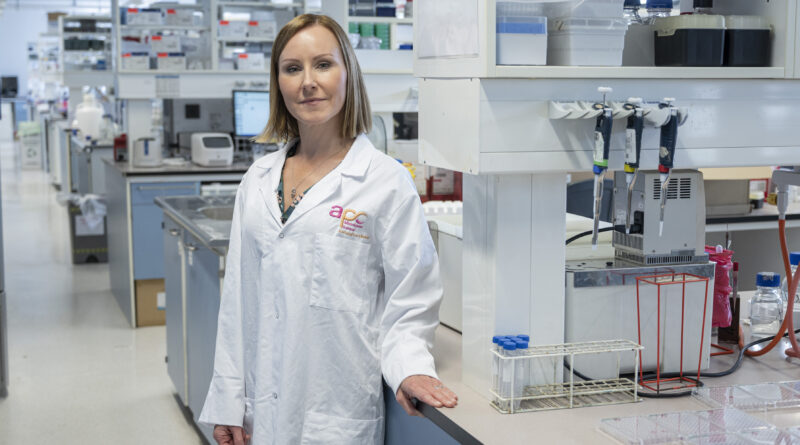Does the Gut Microbiome Hold the Key to Gender Differences in Pain?
The gut microbiome has been linked to higher pain responses in women in an APC Microbiome Ireland study led by University College Cork’s Dr Siobhain O’Mahony and Prof George Shorten. The study published in the journal Brain Behaviour and Immunity highlights the possibilities for innovative individual targeted therapies for pain management. Notably women demonstrated different pain thresholds at various stages of their menstrual cycles.
Gender differences in pain conditions as well as therapy to reduce pain have been known for some time. While several factors such as genetic, neuronal, hormonal, psychological and social factors have been identified as potentially playing a role in these differences the underlying mechanisms are not fully understood. Yet information on which factors are more important in pain could inform the development of urgent and effective gender specific treatments.

Key findings:
- Specific bacteria and their products are linked to higher pain and stress hormones in women at certain stages of the menstrual cycle.
- Women are more sensitive to an electrical pain stimulus compared to men at all stages of the menstrual cycle.
- Hormonal contraceptive use is associated with changes to specific bacteria in the gut and gut permeability.
The gut microbiota are acknowledged as playing important roles in our health and disease. The microorganisms within our gut and the metabolites they produce can directly and indirectly affect our brain, including pain signalling pathways. This study allowed us to investigate if the gut microbiota and critical signalling components influence pain thresholds. And whether sex, menstrual cycle, and hormonal contraceptive use might also play roles for inter-sex differences in pain perception.
Healthy, non-obese men and women (some of whom were using hormonal contraceptives), were recruited. Male subjects were invited to undergo testing once, whereas females were invited three times across the menstrual cycle. On test days, electrical stimulation on the right ankle was performed; stress hormones, inflammation, gut health as well as the gut microbiota and their metabolites were also measured.
Researchers observed that the pain tolerance threshold/pain sensation threshold ratio was significantly lesser in women than men and that the amount of certain bacteria were linked with pain sensation thresholds and stress hormone levels in women only and during a specific stage of the menstrual cycle. In comparison with men, women displayed overall stronger associations between microbiota metabolites, stress hormones and inflammatory factors in blood and pain levels. Further, hormonal contraceptive use was associated with increased gut permeability markers in blood and specific bacteria in the gut.

Dr. Siobhain O’ Mahony, a researcher at APC Microbiome Ireland and Senior Lecturer in the Department of Anatomy and Neuroscience at University College Cork leads new research investigating the role of the gut microbiome in driving differences in pain sensation between men and women. For more information visit apc.ucc.ie
Photography Gerard McCarthy 087 8537228
More info Tina Darb Communications Manager, APC Microbiome Ireland TDarb@ucc.ie
Dr Siobhain O’Mahony, an investigator at APC Microbiome Ireland and Senior Lecturer and Principal Investigator in the Department of Anatomy and Neuroscience, University College Cork said “This research highlights the need to design innovative sex-specific interventions perhaps for all disorders related to the gut microbiota. Our findings support the hypothesis that the gut microbiota may be one of the influencing factors determining the physiological inter-sex differences in pain perception. We plan to continue this exciting research to unravel the molecular mechanisms by which specific sex hormones and gut microbes modulate pain signaling pathways. This study is one of the first to highlight the novel possibilities for innovative individual microbiota targeted therapies for sex specific pain management.”
Prof George Shorten, President of the College of Anaesthesiologists, University College Cork said “The recognition and progressive discovery of important associations between the gut microbiota and somatic pain is novel and exciting. These offer the potential to improve our understanding of pain states, and clearly offer new opportunities to develop pain management therapies. The implication is that maintenance or manipulation of the gut microbiota could influence pain perception favourably, thereby offering novel analgesic “targets” to which existing or newly customised interventions could be directed. These might include prebiotic or probiotic administration, timing or choice of antibiotics, diet, and fasting protocols for those undergoing surgery.”
Prof Paul Ross, Director of APC Microbiome Ireland said “We know that the composition of the gut microbiota has a close association with the human health condition. At APC microbiome Ireland we hope to capitalise on research such as this to design new microbiome based strategies to improve patient outcomes and well being.”
Prof John Cryan, Vice President for Research and Innovation at University College Cork who is co-author on the study said “Although a small study it shows the importance of gut microbes in other aspects of health, in this case pain.”
Read our Latest News

